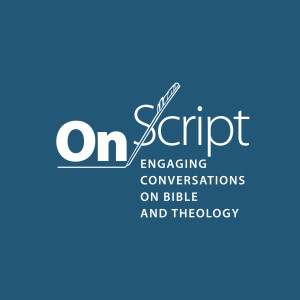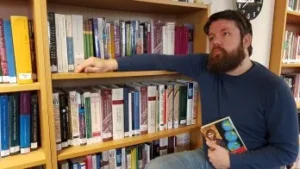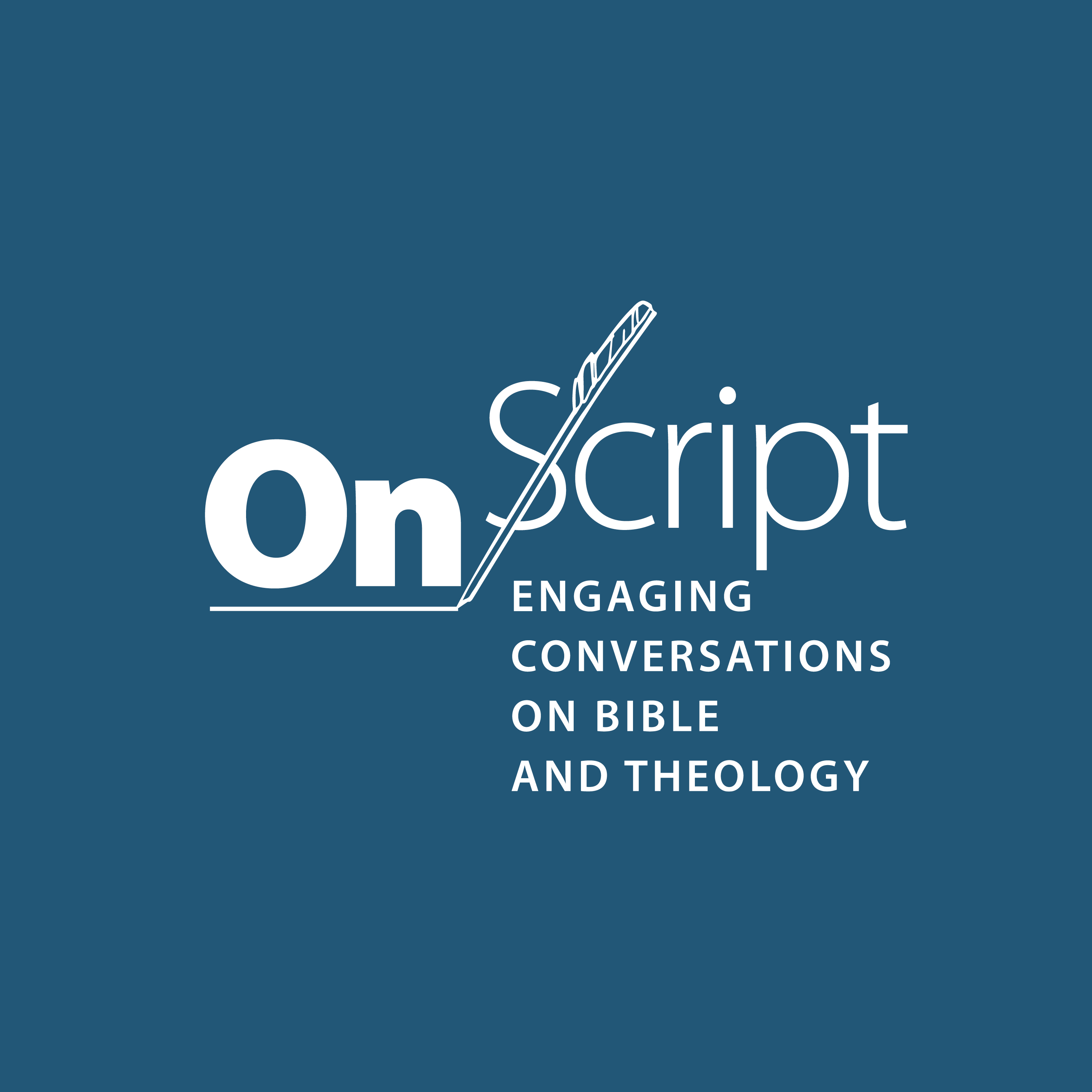Episodes

4 days ago
Gregory Lee - The Essential City of God
4 days ago
4 days ago
 Episode: Gregory Lee talks with Amy Brown Hughes about one of the more well-known but little-understood books in theology, Augustine's The City of God! This episode covers everything from political theology, loving angels as your neighbors, and the fall of Rome to demons, Augustine's view of women, and God as father and mother. A perfect episode and book for those who've long wanted to grapple with this central theological tome!
Episode: Gregory Lee talks with Amy Brown Hughes about one of the more well-known but little-understood books in theology, Augustine's The City of God! This episode covers everything from political theology, loving angels as your neighbors, and the fall of Rome to demons, Augustine's view of women, and God as father and mother. A perfect episode and book for those who've long wanted to grapple with this central theological tome!
Guest: Gregory Lee is Associate Professor of Theology and Urban Studies at Wheaton College. He's the author of Today When Your Hear His Voice: Scripture, the Covenants, and the People of God (Eerdmans, 2016) and The Essential 'City of God' (Baker, 2025), covered in this episode. He's also the co-editor of Christian Political Witness (IVP, 2014). 
Give: Visit our Donate Page if you would like to support OnScript’s work.

Monday Jun 23, 2025
Announcement! Upcoming Live Event with Gary Schnittjer
Monday Jun 23, 2025
Monday Jun 23, 2025
 Join us for a live recording with Dr. Gary Schnittjer at Nashotah House Theological Seminary, WI.
Join us for a live recording with Dr. Gary Schnittjer at Nashotah House Theological Seminary, WI.
When? Thurs, July 24 (2025), 7:15-9:15pm CST (optional dinner at 6:30pm)
Where? Nashotah House Theological Seminary - 2777 Mission Rd, Nashotah, WI 53058, United States
What? Live recording with Gary about his co-authored book, How to Study the Bible's Use of the Bible (Zondervan) Free drinks, snacks, book giveaways, and a chance to connect. Optional dinner for $20 at 6:30pm.
Registration: Sign up for the free event and optional $20 dinner HERE.

Tuesday Jun 03, 2025
Kyle Keimer - Misunderstanding Sacrifice (part 2)
Tuesday Jun 03, 2025
Tuesday Jun 03, 2025
 Episode: Kyle Keimer joins to add insights from archaeology to an earlier episode called Misunderstanding Sacrifice (listen HERE). Dru and Matt L talk about the incomplete pictures gained from archaeology AND the Bible, and how to grapple with both.
Episode: Kyle Keimer joins to add insights from archaeology to an earlier episode called Misunderstanding Sacrifice (listen HERE). Dru and Matt L talk about the incomplete pictures gained from archaeology AND the Bible, and how to grapple with both.
Guest/Co-Host: Kyle Keimer is know to listeners of our Biblical World podcast, and follow THIS link to get to know him more.
Give: Visit our Donate Page if you would like to support OnScript’s work. 
Image Attribution: By illustrators of the 1890 Holman Bible - http://thebiblerevival.com/clipart/1890holmanbible/bw/altarofincensealtarofburnt-offeringlaver.jpg, Public Domain, https://commons.wikimedia.org/w/index.php?curid=9424389

Tuesday May 20, 2025
Michelle Knight - The Prophet's Anthem
Tuesday May 20, 2025
Tuesday May 20, 2025
 Episode: What is the Song of Deborah doing in the middle of the Judges narrative? Michelle Knight argues that the pom changes the way we read the story it fits within. Moreover, this potent poem address issues like sexual violence, gender dynamics, leadership cover-ups, power struggles, and the ways that military might does or doesn't cohere with God's view of the world. Listen and enjoy insights from Michelle's recent book, The Prophet's Anthem: The Song of Deborah and Barak in the Narrative of Judges (Baylor, 2024).
Episode: What is the Song of Deborah doing in the middle of the Judges narrative? Michelle Knight argues that the pom changes the way we read the story it fits within. Moreover, this potent poem address issues like sexual violence, gender dynamics, leadership cover-ups, power struggles, and the ways that military might does or doesn't cohere with God's view of the world. Listen and enjoy insights from Michelle's recent book, The Prophet's Anthem: The Song of Deborah and Barak in the Narrative of Judges (Baylor, 2024).
Guest: Michelle Knight is Associate Professor of Old Testament and Semitic Languages at Trinity Evangelical Divinity School. She's s the author of The Prophet’s Anthem: The Song of Deborah and Barak in the Narrative of Judges (BUP, 2024). She also serves as Senior Reviewer for the Historical Books for the New Living Translation. Her current research interests include narrative criticism, theology of the Old Testament, the Former Prophets (esp. Joshua and Judges), and poetry in biblical narrative. 
Give: Visit our Donate Page if you would like to support OnScript’s work.

Monday May 05, 2025
Malka Simkovich - Diaspora in Jewish Antiquity
Monday May 05, 2025
Monday May 05, 2025
 Episode: Malka Simkovich is back on the podcast to discuss her new book Letters from Home: The Creation of Diaspora in Jewish Antiquity (PSU Press/Eisenbrauns, 2024). We talk about how early Jewish communities in the land of Israel and those outside thought about each other, tried to keep connected, and how they thought about the relationship between being Jewish and being in the land.
Episode: Malka Simkovich is back on the podcast to discuss her new book Letters from Home: The Creation of Diaspora in Jewish Antiquity (PSU Press/Eisenbrauns, 2024). We talk about how early Jewish communities in the land of Israel and those outside thought about each other, tried to keep connected, and how they thought about the relationship between being Jewish and being in the land.
Guest: Dr. Malka Simkovich is the Editor-in-Chief of The Jewish Publication Society and Visiting Professor at Yeshiva University’s Revel Graduate School for Jewish Studies. Before taking up the role at JPS, she was the Crown-Ryan Chair of Jewish Studies at Catholic Theological Union from 2014–2024. She’s the author of The Making of Jewish Universalism: From Exile to Alexandria (Lexington, 2016), Discovering Second Temple Literature (JPS, 2018). Her most recent book is Letters From Home: The Creation of Diaspora in Jewish Antiquity (PSU Press/Eisenbrauns, 2024), the subject of the present episode. She's also the author of many scholarly and popular articles. 
Give: Visit our Donate Page if you would like to support OnScript’s work.

Tuesday Apr 01, 2025
Ervine Sheblazm - The Cheerful Taker
Tuesday Apr 01, 2025
Tuesday Apr 01, 2025
 Episode: Back for what feels like the 100th time, Dr. Ervine Sheblazm!! You're in for a treat with this episode. Dr. Sheblazm unveils what some consider the most innovative economic approach since the advent of bartering. Sheblazm's work sent shockwaves through the stalls of Wall Street, and through the nervous system of every economic theorist battered by the prevailing winds of our culture's obsession with "getting money right." The good Dr. exposes the fatal flaws in our current system, and invites us to the economic table of 1 Tim, 1 Cor, and other New Testament giants. Listen, and then read The Cheerful Taker: A New Economics for Pauline Christians in a Changing World (Sheblazm Press, 2025).
Episode: Back for what feels like the 100th time, Dr. Ervine Sheblazm!! You're in for a treat with this episode. Dr. Sheblazm unveils what some consider the most innovative economic approach since the advent of bartering. Sheblazm's work sent shockwaves through the stalls of Wall Street, and through the nervous system of every economic theorist battered by the prevailing winds of our culture's obsession with "getting money right." The good Dr. exposes the fatal flaws in our current system, and invites us to the economic table of 1 Tim, 1 Cor, and other New Testament giants. Listen, and then read The Cheerful Taker: A New Economics for Pauline Christians in a Changing World (Sheblazm Press, 2025).
Guest: Dr. Sheblazm is an accomplished scientist and theologian, and a long-time friend of the podcast. He's the author of many works, including Faultlines in the Horizon, Feathers on the Nose, Paul's Theology of Universalism, A Life Living (A Theological Memoir), Child Rearing with the Apostle Paul, and much more, including his newest work, The Cheerful Taker: A New Economics for Pauline Christians in a Changing World, published by Sheblazm Press, 2025. Of course Dr. Shblazm has doctorates from prestigious online universities, and runs the Centre for Excellence in the Lake District of England.
Give: Visit our Donate Page if you would like to support OnScript’s work.

Thursday Mar 20, 2025
Nijay Gupta - The Affections of Christ Jesus
Thursday Mar 20, 2025
Thursday Mar 20, 2025
 Episode: "What is love? (Baby, don't hurt me)." These song lyrics--juxtaposing love and hurt--remind us that 'love' is used so frequently and flexibily in our culture that it is in danger of losing all meaning. Enter Nijay Gupta and his new book The Affections of Christ Jesus! In this episode he helps rescue 'love' by deftly unpacking its biblical meanings and by correcting common misunderstandings. (For example, agape love is frequently misunderstood.) In so doing Gupta shows that love--surprisingly!-- may be the best center for Paul's theology. Since God's beautiful love changes us, his work exposing that love helps bolster our flagging affections. This love-fest is cohosted by Matt Bates.
Episode: "What is love? (Baby, don't hurt me)." These song lyrics--juxtaposing love and hurt--remind us that 'love' is used so frequently and flexibily in our culture that it is in danger of losing all meaning. Enter Nijay Gupta and his new book The Affections of Christ Jesus! In this episode he helps rescue 'love' by deftly unpacking its biblical meanings and by correcting common misunderstandings. (For example, agape love is frequently misunderstood.) In so doing Gupta shows that love--surprisingly!-- may be the best center for Paul's theology. Since God's beautiful love changes us, his work exposing that love helps bolster our flagging affections. This love-fest is cohosted by Matt Bates.
The Book: Nijay Gupta, The Affections of Christ Jesus: Love at the Heart of Paul's Theology (Grand Rapids: Eerdmans, 2025). Pauline scholars have long debated the so-called center of Paul’s theology, focusing on themes like justification by faith, reconciliation, union with Christ, and the apocalyptic triumph of God in Christ. In this innovative study, Nijay Gupta offers a new perspective that emphasizes Paul’s understanding of love at the heart of the gospel he preached.
Through careful examination of the historical, cultural, and linguistic milieu in which Paul was working, Gupta identifies what is unique and important in Paul’s theology of love. In so doing, Gupta helps readers develop a deeper appreciation for the extent to which love permeates Paul’s understanding of the triune God, the gospel, the community, and the mission and lifestyle of God’s people.. (Publisher’s description).
 Guest: Nijay K. Gupta (PhD, Durham) is professor of New Testament at Northern Seminary where he holds the Julius R. Mantey Chair of New Testament. He has written numerous books, including recent titles such as Tell Her Story (IVP Academic) and Galatians (The Story of God Commentary series by Zondervan Academic). He has been our guest on OnScript several times, most recently for Strange Religion (Brazos, 2024) and Paul and the Language of Faith (Eerdmans, 2020). Gupta has a substack called Engaging Scripture.
Guest: Nijay K. Gupta (PhD, Durham) is professor of New Testament at Northern Seminary where he holds the Julius R. Mantey Chair of New Testament. He has written numerous books, including recent titles such as Tell Her Story (IVP Academic) and Galatians (The Story of God Commentary series by Zondervan Academic). He has been our guest on OnScript several times, most recently for Strange Religion (Brazos, 2024) and Paul and the Language of Faith (Eerdmans, 2020). Gupta has a substack called Engaging Scripture.
OnScript’s Review: “Love is an emotional knot. Nijay Gupta disentangles love by using Scripture and other resources to tease out its beautiful strands. When we discover the quality of love that is at the heart of the gospel, not only is Paul’s theology clarified, but our affections are changed. Disciples who yearn for a greater love for God and neighbor will rejoice over The Affections of Christ Jesus.”—Matthew W. Bates, author of Beyond the Salvation Wars; professor of New Testament, Northern Seminary.
Give: Visit our Donate Page if you would like to support OnScript’s work.

Tuesday Mar 11, 2025
Timothy Brookins - Rediscovering the Wisdom of the Corinthians
Tuesday Mar 11, 2025
Tuesday Mar 11, 2025
 Episode: Timothy Brookins wants to challenge the scholarly consensus about the conflict behind the book of 1 Corinthians. Listen in as Brookins discusses with Chris Tilling the importance of Stoicism for understanding the rhetoric and message of this crucial Pauline letter!
Episode: Timothy Brookins wants to challenge the scholarly consensus about the conflict behind the book of 1 Corinthians. Listen in as Brookins discusses with Chris Tilling the importance of Stoicism for understanding the rhetoric and message of this crucial Pauline letter!
Guest: Timothy Brookins is Professor of Early Christianity at the University of St. Thomas, Houston. In addition to the book featured in this episode, Rediscovering The Wisdom of the Corinthians: Paul, Stoicism, and Spiritual Hierarchy (Eerdmans, 2024), he's the author of Ancient Rhetoric and the Style of Paul's Letters (Cascade, 2022), First and Second Thessalonians (Baker, 2021); Reading 1 Corinthians (Smyth & Helwys, 2020); 1 Corinthians: A Handbook on the Greek Text. 2 Vols (Baylor, 2016), and Corinthian Wisdom, Stoic Philosophy, and the Ancient Economy (Cambridge University Press, 2014). 
Give: Visit our Donate Page if you would like to support OnScript’s work.

Thursday Feb 27, 2025
“I Practice Scales to Become a Saint” - Coltrane: Christ Followers & Artists
Thursday Feb 27, 2025
Thursday Feb 27, 2025
 Episode: Artists and Christ followers walk a similar path, as those who discern the truth about the world. The artistic gift of intuitive discernment, of expressing reality with clarity and soul, relates to the Christian gospel. In this syndicated episode of the Blue Note Theology podcast, Mark explores a woven kinship between artists and Christ followers while playing the grand piano.
Episode: Artists and Christ followers walk a similar path, as those who discern the truth about the world. The artistic gift of intuitive discernment, of expressing reality with clarity and soul, relates to the Christian gospel. In this syndicated episode of the Blue Note Theology podcast, Mark explores a woven kinship between artists and Christ followers while playing the grand piano.
Guest Host: For more about Mark, his podcast, speaking, and writing, visit his site – https://www.markglanville.org.
Check out Blue Note Theology
Check out our episode with Makoto Fujimura

Wednesday Feb 05, 2025
John Behr - Gregory of Nyssa: On the Human Image of God
Wednesday Feb 05, 2025
Wednesday Feb 05, 2025
 Episode: In this episode we welcome back Fr John Behr! Long-time listeners will be familiar with Fr John's delightful live two-part episode on Origen of Alexandria (Part 1 & Part 2). In this episode co-host Amy Hughes speaks with Fr John about his new translation of Gregory of Nyssa's On the Human Image of God (aka On the Making of Humanity). The conversation ranges from discussing what it's like to work on a translation to nerding out about Gregory - for this we will not apologize! This work is the first theological anthropology where Gregory muses on the mundane (yet fascinating) like, why do humans sleep or yawn or eat. He also considers big questions about the image of God, evil, the resurrection, the body, etc. Fr Behr's translation centers this wonderful text again with its uncanny relevance for current questions and delightfully weird diversions.
Episode: In this episode we welcome back Fr John Behr! Long-time listeners will be familiar with Fr John's delightful live two-part episode on Origen of Alexandria (Part 1 & Part 2). In this episode co-host Amy Hughes speaks with Fr John about his new translation of Gregory of Nyssa's On the Human Image of God (aka On the Making of Humanity). The conversation ranges from discussing what it's like to work on a translation to nerding out about Gregory - for this we will not apologize! This work is the first theological anthropology where Gregory muses on the mundane (yet fascinating) like, why do humans sleep or yawn or eat. He also considers big questions about the image of God, evil, the resurrection, the body, etc. Fr Behr's translation centers this wonderful text again with its uncanny relevance for current questions and delightfully weird diversions.
Guest: Fr. John Behr was appointed to the Regius Chair in Humanity at the University of Aberdeen in the summer of 2020, having taught at St Vladimir’s Seminary since 1995, serving there as Dean from 2007–17. His early work was on asceticism and anthropology, focusing on St Irenaeus of Lyons and Clement of Alexandria (OUP 2000). He is currently writing a series of books on “The Formation of Christian Theology”, two volumes of which have already appeared: vol. 1, The Way to Nicaea (SVS Press 2001) and vol. 2 The Nicene Faith (SVS Press 2003). On the basis of these two volumes, he published a synthetic work, The Mystery of Christ: Life in Death (SVS 2006). This was followed by an edition and translation of the fragments of Diodore of Tarsus and Theodore of Mopsuestia, setting them in their historical and theological context (OUP 2011). More recently he published a more poetic and meditative work entitled Becoming Human: Theological Anthropology in Word and Image (SVS Press, 2013) and a full study of St Irenaeus: St Irenaeus of Lyons: Identifying Christianity (OUP, 2013). He also completed a new critical edition and translation of Origen’s On First Principles, together with an extensive introduction, for OUP (2017), and John the Theologian and His Paschal Gospel: A Prologue to Theology (OUP 2019). Most recently, he published a new translation of Gregory of Nyssa's On the Human Image of God (aka On the Making of Humanity). (adapted from the University of Aberdeen website). 
Give: Visit our Donate Page if you would like to support OnScript’s work.


